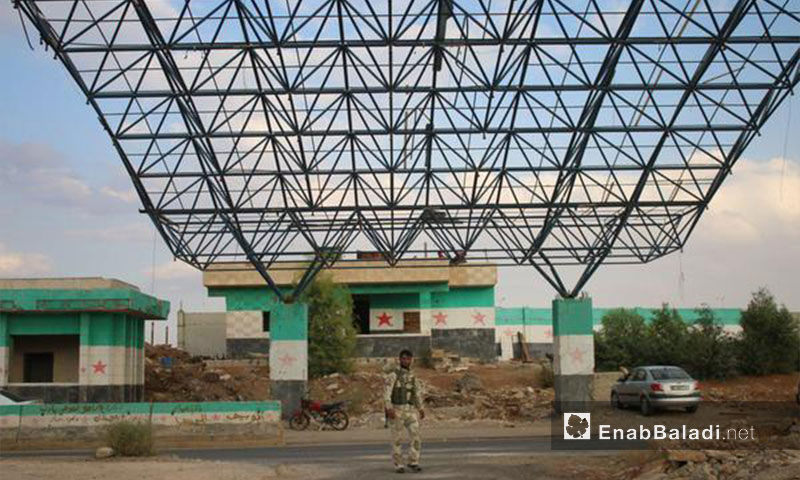



In the past a few days, the Nasib Border Crossing has taken the scene in Daraa Governorate, in the south-west of Syria, as a result of Jordan’s extensive actions seeking to reopen the crossing after more than two years and a half of being closed.
The Jordanian actions took the shape of a suggestion that has been offered to the opposition in Daraa after a meeting in Amman, the capital city of Jordan. The addressed opposition carried the proposal to Syria to discuss it with civil and military parties before phrasing an official answer.
Only a few days after the opposition’s delegation had returned to Syria, the rumours began to spread covering the scene with additional confusion and ambiguity. The clamour forced The Free Daraa Council to make intensive visits to military and civil councils and meet with the popular establishments in different towns to explain the nature of Amman meetings and the reality of the proposal.
Informed sources summarised the proposal in two options. The first option is to open the crossing through a civil formula, which both the Syrian Regime and the opposition agree to. The second option will be done by Jordan, which, as a first step, will go to Al-Suwayda Governorate, in the southernmost of Syria, to open a crossing through it. The second step will be closing all the humanitarian crossings in Daraa, in a message that sounds like a threat more than a cooperation proposal between the two parties.
The reaction was fast. A number of civil bodies and military factions expressed their views on opening the border crossing. The first of these views are presented in a joint statement issued by a number of local councils in Daraa’s western countryside and another by prominent military factions who relate opening the border crossing to a number of conditions considered by the crossing agreement’s signatories as the fundamentals of the Syrian Revolution.
A leader in the Free Army in the town of Nimrah, Abdo Al-Rifai, described the efforts to reopen the Nasib Border Crossing as “an international attempt to reproduce the Syrian Regime,” considering the current endeavours as “a bait for the revolution in Daraa to force it to conduct relations and to acknowledge the Syrian Regime, thus, to restore the regime’s legitimacy, declaring that the revolution has given up toppling it”.
The leader stipulated that any efforts to reopen the crossing should be linked to strict conditions agreed upon by the regional parties, explaining to Enab Baladi that “If the regional countries are aiming to reopen the border crossing, we must make it clear to them that the border crossing will not be opened except on our terms and in a manner that ensures the interests of the liberated regions in the south”.
The leader warned the leadership of the opposing political and military organizations operating in Daraa against giving up to external pressure and making concessions in relation to this issue, pointing that “The street, after all the sacrifices it made, will not accept them to be sold or abandoned by the opposition due to pressure. […] We fear to fall into the trap that aims to drag the southern area to an internal war because of the crossing”.
On its turn, the field official, responsible for the distribution of relief materials in Daraa, Shadi Almasalha, believes that “Threats of closing the humanitarian crossings and placing them in the Syrian Regime’s hands in the future is a dangerous development and must be taken seriously”.
To Enab Baladi, he said that “Jordan’s suggestion of this option and the possibility of implementing it in the future create a nightmare for relief organizations and associations in the south,” adding that, “we have experienced closing the borders in the face of relief work in former times; livelihood deteriorated so fast for the prices soared high in a crazy manner”.
The relief official called for “Considering the suggested options in relation to the Nasib Border Crossing. […] We call for neutralizing humanitarian and relief aspects away from the border crossing issue, but we should consider all the potentials”.
He expressed his full understanding of the pressures exerted on the opposition in relation to this issue, and pointed out that “All the workers and officials operating in relief organizations and committees are part of these pressures. They are also part of the revolution and have the right to express their opinion on the issue of the crossing and to confirm their rejection of any participation of the regime. However, we are thinking of the future of the situation in case the threats of closing the humanitarian crossings were implemented”.
The relief official described what is currently happening as “a storm” and suggested a solution to face it, which is to “bend a little and to make some carefully studied concessions”.
The relationship between Jordan and the Syrian Revolution, in general, and in Daraa, in particular, is a controversial matter. Jordan has officially maintained its relationship with the Assad’s Regime but has constructed strong relationships with the military factions in the south.
Though Assad and his regime have repeatedly accused the Jordanian authorities of supporting and financing the opposition, their relationship did not reach the stage of total estrangement.
In their turn, many observers of this relationship consider the chaos that occurred after the opposition took control of the Nasib Border Crossing in April 2015 and its failure to protect Syrian and Jordanian public and private interests as the negative turning point in the relationship between Jordan and the opposition, declaring the abandonment of any development of the political relationship between two sides.
Facing the triangle of Jordan, the Syrian Regime and the opposition, the street in Daraa is still waiting to know the hand that will hold the keys of the Nasib Border Crossing.
if you think the article contain wrong information or you have additional details Send Correction